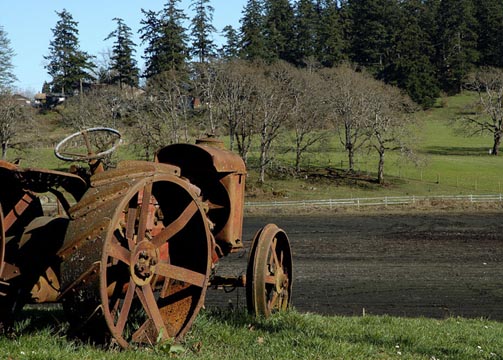I’m thinking of the Occupy movement, knowing it’s getting on time for me to feed the chickens. I think of making a funny, political tweet to stand as a closure to my day:
“About to go Occupy the chicken coop.”
But, thankfully I refrain and leave myself to contemplate an intersection between the Occupy movement and farming.
At first I feel a little guilty that I haven’t joined in. I haven’t gone to a rally nor re-posted any cool links to great Occupy videos. Heck, I haven’t even watched most of them. And this makes me feel a little lousy because I get the movement and do believe in it. I certainly have a nostalgia for the person I was in the past who had always been on the frontlines of mass protest movements.
Now, I’m scrambling. Between half a dozen jobs and small contracts, I’m working to pay my mortgage. A mortgage for a house and a five-acre property in rural British Columbia. I’ve got three kids, we homeschool, and we have a small flock of chickens.
Yes, the chickens. The chickens are starting to squawk, reminding me that they need to be fed.
And as I’m out there in their damp and cool enclosure; feeding them, collecting their eggs, and checking into their general health and well-being, it becomes clear to me that I myself am Occupied, both literally and figuratively. Indeed, being Occupied as I am, with my family and small farm has been somewhat of a salvation to me. In accordance with that, I feel an empathy with those who also feel the need to Occupy.
Their need to Occupy, would seem apparent when you consider the changing demographics of North American geography. The population balance of this continent has perpetually tipped in the direction towards urban and suburban expansion. Never has a larger population lived in the cities. Never have a smaller population lived in the country.
So it makes sense that there is a yearning to occupy land. Not coincidentally, on my Facebook feed, a friend posted a link to a story with the headline: “Young farmers: A growing movement.”
The funny thing about the article is that the author recounts a conversation where she observes that young people talk about idealizing the values of farming but, notably aren’t actually farming.
The truth is that not many people are farming these days, particularly not young people. The “family farm” has been consolidated into ever larger farming operations. Throughout western Canada, it’s not uncommon that so called “family farms” are over 10 sections. That’s 6,400 acres, an amount of land exponentially too massive to cultivate by hand or even by tractor. Rather, these operations require some serious combine machinery that requires some serious capital.
Translating this into the Occupy movement’s terminology, the 99 per cent in North America no longer own their own viable land, nor is the 99 per cent food sufficient.
There is no comprehensive national food security strategy and there is no stemming the concentration of farming to massive capital intensive operations.
In fact, the opposite is true. the present battle that prairie farms face with the closure of the Canadian Wheat Board is an example where the minority of large farmers are controlling policy at the expense of small farmers (who cannot hope to market their product internationally without the Wheat Board), for the ultimate benefit of agri-companies like Cargill and Viterra.
In my small rural community, the local organic vegetable farmers see no future for the market farm. Despite long, skilled hours in the fields, in the greenhouses and on the road, profits are scarce, risk of crop failure is perpetually high and delivering food to the marketplace in a timely manner is a constant challenge. Further compounding the challenges of small-scale farming are a litany of policy and regulations that undermine the income and livelihood of subsistence farmers. For example, a goat farmer not far from where I live routinely pours her fresh goat milk down the drain because she’s not allowed to sell it as unpasteurized milk and her scale isn’t large enough to make pasteurizing worthwhile. The same barriers are faced by farmers in almost every field diminishing the ability and culture of earning income from “gate sales.”
The real family farm, those that feed our communities and markets with quality local produce, grain, meat, dairy and eggs are dying and with them struggle the small agricultural towns that, with a smaller population base, are becoming increasingly poorly serviced. Schools and recreational facilities are shutting down as the population ages to extinction.
And so out here, we’re losing the battle. As small farmers we do “occupy” our land but barely.
The 99 per cent need to look more literally at their desire to Occupy. Presently, if the 1 per cent were shut down, food distribution and other critical primary services would cease. The 99 per cent need to improve their self-sufficiency.
This is a long-term project but perhaps we will begin to see a movement that demands land reform and policy change so that the 99 per cent can re-occupy the arable land in thriving communities that promote the ideal of living without a geographic dependence on the 1 per cent.
Zev Tiefenbach is a writer and farm labourer living in an agricultural community in rural B.C. Food security is at the core of his radical politics and as an urban dweller was co-founder of the People’s Potato, a Montreal-based vegan soup kitchen. His website can be found by clicking here.



